Unit 10 You’re supposed to shake hands第一课时完美版
- 格式:ppt
- 大小:2.46 MB
- 文档页数:21
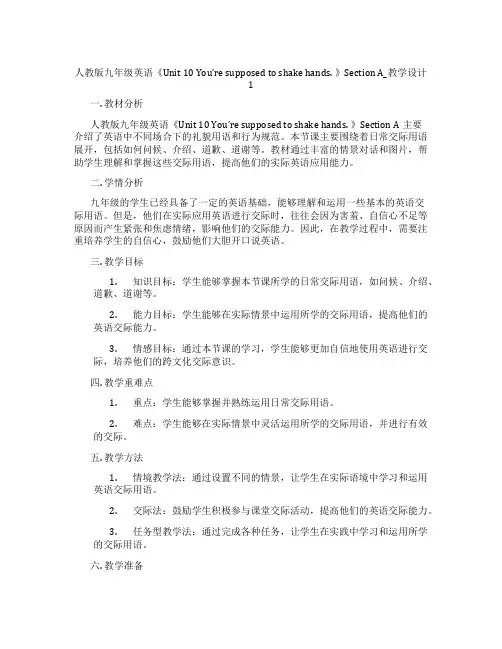
人教版九年级英语《Unit 10 You’re supposed to shake hands. 》Section A_教学设计1一. 教材分析人教版九年级英语《Unit 10 You’re supposed to shake hands. 》Section A主要介绍了英语中不同场合下的礼貌用语和行为规范。
本节课主要围绕着日常交际用语展开,包括如何问候、介绍、道歉、道谢等。
教材通过丰富的情景对话和图片,帮助学生理解和掌握这些交际用语,提高他们的实际英语应用能力。
二. 学情分析九年级的学生已经具备了一定的英语基础,能够理解和运用一些基本的英语交际用语。
但是,他们在实际应用英语进行交际时,往往会因为害羞、自信心不足等原因而产生紧张和焦虑情绪,影响他们的交际能力。
因此,在教学过程中,需要注重培养学生的自信心,鼓励他们大胆开口说英语。
三. 教学目标1.知识目标:学生能够掌握本节课所学的日常交际用语,如问候、介绍、道歉、道谢等。
2.能力目标:学生能够在实际情景中运用所学的交际用语,提高他们的英语交际能力。
3.情感目标:通过本节课的学习,学生能够更加自信地使用英语进行交际,培养他们的跨文化交际意识。
四. 教学重难点1.重点:学生能够掌握并熟练运用日常交际用语。
2.难点:学生能够在实际情景中灵活运用所学的交际用语,并进行有效的交际。
五. 教学方法1.情境教学法:通过设置不同的情景,让学生在实际语境中学习和运用英语交际用语。
2.交际法:鼓励学生积极参与课堂交际活动,提高他们的英语交际能力。
3.任务型教学法:通过完成各种任务,让学生在实践中学习和运用所学的交际用语。
六. 教学准备1.教学课件:制作课件,包括文本、图片、音频等素材,以便于教学展示。
2.教学道具:准备一些日常交际用语相关的道具,如名片、礼物等,以便于课堂操练。
3.教学资源:收集一些关于日常交际用语的视频素材,用于课堂拓展。
七. 教学过程1.导入(5分钟)利用学生日常生活中的一些交际场景,如问候、介绍等,引导学生思考和讨论这些场景下应该如何用英语进行交际。
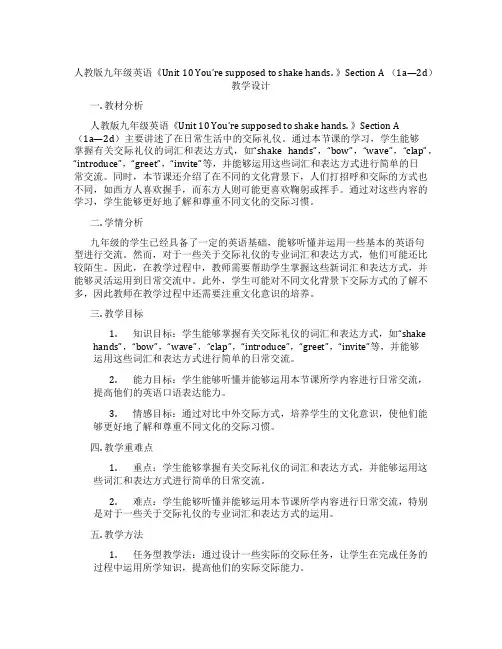
人教版九年级英语《Unit 10 You’re supposed to shake hands. 》Section A (1a—2d)教学设计一. 教材分析人教版九年级英语《Unit 10 You’re supposed to shake hands. 》Section A(1a—2d)主要讲述了在日常生活中的交际礼仪。
通过本节课的学习,学生能够掌握有关交际礼仪的词汇和表达方式,如“shake hands”,“bow”,“wave”,“clap”,“introduce”,“greet”,“invite”等,并能够运用这些词汇和表达方式进行简单的日常交流。
同时,本节课还介绍了在不同的文化背景下,人们打招呼和交际的方式也不同,如西方人喜欢握手,而东方人则可能更喜欢鞠躬或挥手。
通过对这些内容的学习,学生能够更好地了解和尊重不同文化的交际习惯。
二. 学情分析九年级的学生已经具备了一定的英语基础,能够听懂并运用一些基本的英语句型进行交流。
然而,对于一些关于交际礼仪的专业词汇和表达方式,他们可能还比较陌生。
因此,在教学过程中,教师需要帮助学生掌握这些新词汇和表达方式,并能够灵活运用到日常交流中。
此外,学生可能对不同文化背景下交际方式的了解不多,因此教师在教学过程中还需要注重文化意识的培养。
三. 教学目标1.知识目标:学生能够掌握有关交际礼仪的词汇和表达方式,如“shakehands”,“bow”,“wave”,“clap”,“introduce”,“greet”,“invite”等,并能够运用这些词汇和表达方式进行简单的日常交流。
2.能力目标:学生能够听懂并能够运用本节课所学内容进行日常交流,提高他们的英语口语表达能力。
3.情感目标:通过对比中外交际方式,培养学生的文化意识,使他们能够更好地了解和尊重不同文化的交际习惯。
四. 教学重难点1.重点:学生能够掌握有关交际礼仪的词汇和表达方式,并能够运用这些词汇和表达方式进行简单的日常交流。
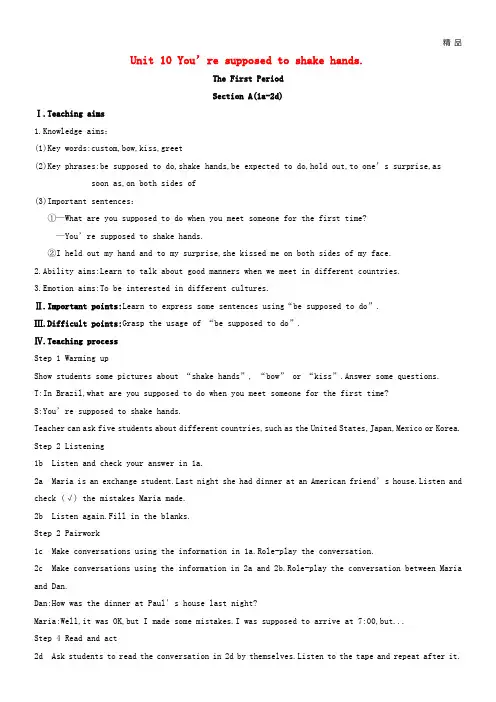
Unit 10 You’re supposed to shake hands.The First PeriodSection A(1a-2d)Ⅰ.Teaching aims1.Knowledge aims:(1)Key words:custom,bow,kiss,greet(2)Key phrases:be supposed to do,shake hands,be expected to do,hold out,to one’s surprise,assoon as,on both sides of(3)Important sentences:①—What are you supposed to do when you meet someone for the first time?—You’re supposed to shake hands.②I held out my hand and to my surprise,she kissed me on both sides of my face.2.Ability aims:Learn to talk about good manners when we meet in different countries.3.Emotion aims:To be interested in different cultures.Ⅱ.Important points:Learn to express some sentences using“be supposed to do”.Ⅲ.Difficult points:Grasp the usage of “be supposed to do”.Ⅳ.Teaching processStep 1 Warming upShow students some pictures about “shake hands”, “bow” or “kiss”.Answer some questions.T:In Brazil,what are you supposed to do when you meet someone for the first time?S:You’re supposed to shake hands.Teacher can ask five students about different countries,such as the United States,Japan,Mexico or Korea. Step 2 Listening1b Listen and check your answer in 1a.2a Maria is an exchange st night she had dinner at an American friend’s house.Listen and check (√) the mistakes Maria made.2b Listen again.Fill in the blanks.Step 2 Pairwork1c Make conversations using the information in 1a.Role-play the conversation.2c Make conversations using the information in 2a and 2b.Role-play the conversation between Maria and Dan.Dan:How was the dinner at Paul’s house last night?Maria:Well,it was OK,but I made some mistakes.I was supposed to arrive at 7:00,but...Step 4 Read and act2d Ask students to read the conversation in 2d by themselves.Listen to the tape and repeat after it.Work in pairs and act it out.Language points1.In your country,what are you supposed to do when you meet someone for the first time?在你们国家,当你初次与某人见面时你应该做什么?(教材第73页)be supposed to 意为“应该”,后接动词原形,相当于should 或 ought to,用来表示劝告、建议、义务、责任等。
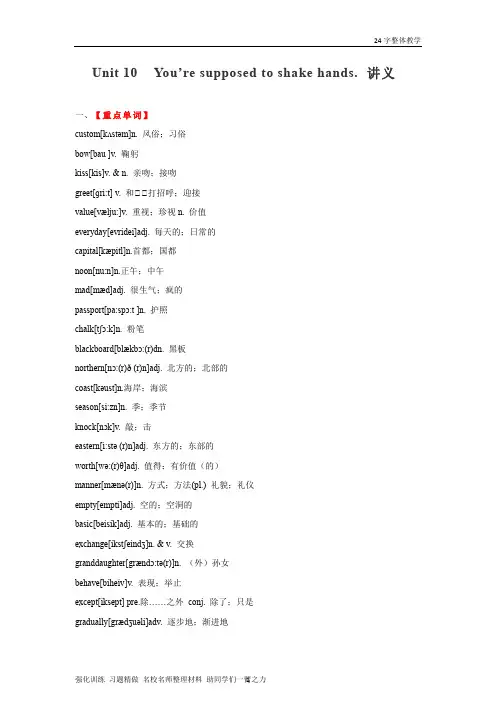
Unit 10 You’re supposed to shake hands. 讲义一、【重点单词】custom[kʌstəm]n. 风俗;习俗bow[bau ]v. 鞠躬kiss[kis]v. & n. 亲吻;接吻greet[ɡri:t] v. 和⋯⋯打招呼;迎接value[vælju:]v. 重视;珍视n. 价值everyday[evridei]adj. 每天的;日常的capital[kæpitl]n.首都;国都noon[nu:n]n.正午;中午mad[mæd]adj. 很生气;疯的passport[pa:spɔ:t ]n. 护照chalk[tʃɔ:k]n. 粉笔blackboard[blækbɔ:(r)dn. 黑板northern[nɔ:(r)ð (r)n]adj. 北方的;北部的coast[kəust]n.海岸;海滨season[si:zn]n. 季;季节knock[nɔk]v. 敲;击eastern[i:stə (r)n]adj. 东方的;东部的worth[wə:(r)θ]adj. 值得;有价值(的)manner[mænə(r)]n. 方式;方法(pl.) 礼貌;礼仪empty[empti]adj. 空的;空洞的basic[beisik]adj. 基本的;基础的exchange[ikstʃeindʒ]n. & v. 交换granddaughter[grændɔ:tə(r)]n. (外)孙女behave[biheiv]v. 表现;举止except[iksept] pre.除……之外conj. 除了;只是gradually[grædʒuəli]adv. 逐步地;渐进地suggestion[sədʒestʃən]n. 建议二、【重点短语】1. be supposed to do sth 应该做…2. be expected to do sth. 应该/被期望做…3. shake hands (with…) (和…) 握手4. bow to sb. 向某人鞠躬5. for the first time 首次,第一次6. people in Korea 韩国的人们7. greet sb.( in) the wrong way 以错误的方式问候某人8. be invited to …... 被邀请去…...9. be invited to do sth. 被邀请做…10.welcome party 欢迎会11. as soon as 一… 就…...(引导时间状从)12. as soon as sb can 尽可能快的......13.hold out (my hands) 伸出(我的手)14. on both sides of my face在我的两个脸颊上15. be from= come from 来自16. be relaxed about 对…放松/随意17. a bit/ little late 晚一点18. value the time we spend with sb珍惜我们与某人度过的时间19.in our everyday lives 在我们的日常生活中20. drop by 顺便拜访,随便进入21. make plans ( to do sth.) 计划做某事22. plan to do sth.计划做某事23. on the side of the face在脸的一侧24. the town center 在城镇中心25. as many as sb can = as many as possible 尽可能多的…26. be on time 守时27. the capital of clocks and watches钟表之都28. after all 毕竟,终归29. at noon 在中午30. 15 minutes late 迟到15分钟31.get mad 大动肝火;气愤32.make an effort 作出努力33.go out of one’s way 特地;格外努力34.make ... feel at home使(某人)感到宾至如归三、【重点句型】1. He should have told me about it.他本应该把这件事告诉我。
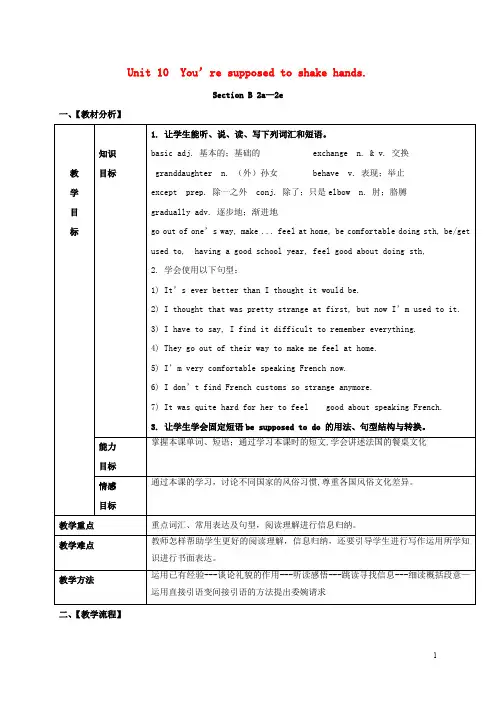
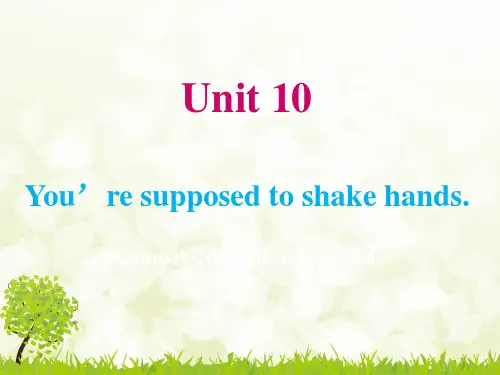
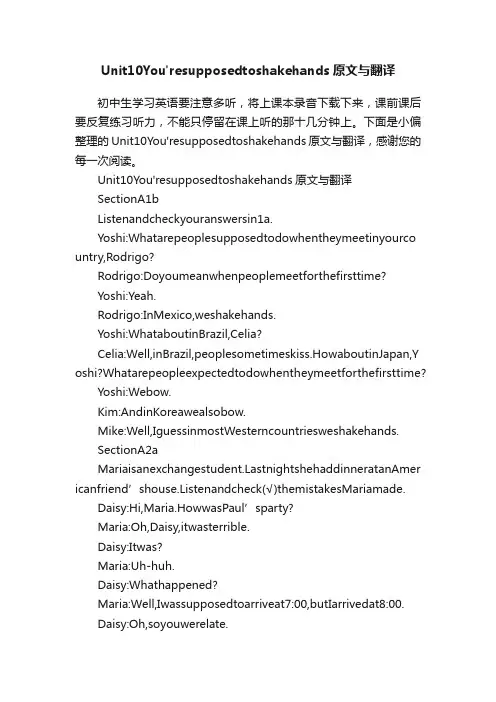
Unit10You'resupposedtoshakehands原文与翻译初中生学习英语要注意多听,将上课本录音下载下来,课前课后要反复练习听力,不能只停留在课上听的那十几分钟上。
下面是小偏整理的Unit10You'resupposedtoshakehands原文与翻译,感谢您的每一次阅读。
Unit10You'resupposedtoshakehands原文与翻译SectionA1bListenandcheckyouranswersin1a.Yoshi:Whatarepeoplesupposedtodowhentheymeetinyourco untry,Rodrigo?Rodrigo:Doyoumeanwhenpeoplemeetforthefirsttime?Yoshi:Yeah.Rodrigo:InMexico,weshakehands.Yoshi:WhataboutinBrazil,Celia?Celia:Well,inBrazil,peoplesometimeskiss.HowaboutinJapan,Y oshi?Whatarepeopleexpectedtodowhentheymeetforthefirsttime?Yoshi:Webow.Kim:AndinKoreawealsobow.Mike:Well,IguessinmostWesterncountriesweshakehands.SectionA2astnightshehaddinneratanAmer icanfriend’shouse.Listenandcheck(√)themistakesMariamade.Daisy:Hi,Maria.HowwasPaul’sparty?Maria:Oh,Daisy,itwasterrible.Daisy:Itwas?Maria:Uh-huh.Daisy:Whathappened?Maria:Well,Iwassupposedtoarriveat7:00,butIarrivedat8:00.Daisy:Oh,soyouwerelate.Maria:Yeah,butinmycountry,it’sdifferent.Whenyou’reinvit edfor7:00,you’reexpectedtocomelater!It’sconsideredstranget oturnupontime.Daisy:Isee.Maria:ThenwhenImetPaul’smom,Ikissedher.Daisy:Oh…youweresupposedtoshakehandsinstead.Maria:That’sright.AndIworeafanc ydress.Daisy:What’swrongwiththat?Maria:Well,itturnedoutthatitwasanoutdoorparty,Daisy.Every oneelsewasinaT-shirtandjeans.Daisy:Iguessnexttimeyoushouldaskwhatyou’resupposedto wear.SectionA2bListenagain.Fillintheblanks.Daisy:Hi,Maria.HowwasPaul’sparty?Maria:Oh,Daisy,itwasterrible.Daisy:Itwas?Maria:Uh-huh.Daisy:Whathappened?Maria:Well,Iwassupposedtoarriveat7:00,butIarrivedat8:00.Daisy:Oh,soyouwerelate.Maria:Yeah,butinmycountry,it’sdifferent.Whenyou’reinvit edfor7:00,you’reexpectedtocomelater!It’sconsi deredstranget oturnupontime.Daisy:Isee.Maria:ThenwhenImetPaul’smom,Ikissedher.Daisy:Oh…youweresupposedtoshakehandsinstead.Maria:That’sright.AndIworeafancydress.Daisy:What’swrongwiththat?Maria:Well,itturnedoutthatitwasanoutdoorparty,Daisy.EveryoneelsewasinaT-shirtandjeans.Daisy:Iguessnexttimeyoushouldaskwhatyou’resupposedto wear.SectionA2dRoleplaytheconversation.Howwasthewelcomepartyforforeignstudentslastnight?Great!Imadesomenewfriends.Butafunnythinghappened.What?ImetaJapaneseboycalledSato,andassoonasIheldoutmyhand, hebowed.That'showpeopleinJapanareexpectedtogreeteachother.It'sim politeifyoudon'tbow.Ididn'tknowthat.SoIjuststoodtherewithmyhandout.Finally,Ire turnedthebow.IrememberwhenlfirstmetMarielastyear,Ididthesamething.Ihe ldoutmyhandandtomysurprise,shekissedmeonbothsidesofmyfac e!Iwouldn'tmindthat!terlfoundoutFrenchpeoplearesupposedtokissw hentheyseeeachother.SectionA3aReadthefollowingopinionsofaColombianandaSwissstudent.I nwhichcountryisitOKtobe15minuteslatefordinner?TeresaLopezCall.ColomblaWhereI’mfrom,we’reprettyrelaxedabouttime.Wedon’tlik etorusharound,sowedon’tmindifpeoplearealittlelatesometimes.Ifyoutellafriendyou’regoingtotheirhousefordinner,it’sOKif youarriveabitlate.Weliketoenjoyourtimeslowly.Wevaluethetimew espendwithourfamilyandfriendsinoureverydaylives.Weoftenjustdropbyourfriendshomesifwehavetime.Wedon’tusuallyhavetomakeplanstomeetourfriends.Whenweseeeachoth er,it’spoliteforboystoshakehandsandforgirlstokisseachotheront hesideoftheface.Weoftenjustwalkaroundthetowncenter,seeingasmanyofourfr iendsaswecan!Marcleblanclausanne.SwitzerlandInSwitzerland,it’sveryimportanttobeontime.We’rethecapi talofclocksandwatches,afterall!Ifsomeoneinvitesyoutomeethimo rheratnoon,thenyou’reexpectedtobethereatnoon.Ifyou’reeven15minuteslate,y ourfriendmaygetmad.SoImake anefforttobeontimewhenImeetmyfriends.Ialwaysleavethehousee arlytoavoidheavytrafficbecauseIthinkit’simpolitetokeepothersw aiting.Also,wenevervisitafriend’shousewithoutcallingfirst.Wealmo stalwaysmakeplanstoseefriends.Weusuallyplantodosomethingin teresting,orgosomewheretogether.SectionB1bSteveisgoingtoChinatostudy.HisfriendYangMingistellinghim aboutthetablemannersinChina.Listenandnumberthepicturesinth eorderyouhearthem.YangMing:YoumustbeexcitedaboutleavingforChinatomorro w,Steve!Steve:Yeah,butI’malittlenervous,too.YangMing:Why?Steve:Well,foronething,Idon’tknowhowtousechopsticksver ywell…andIdon’tknowhowtobehaveatthedinnertable.YangMing:Oh,Isee.Well,oneimportantthingisthatyou’renots upposedtostarteatingfirstifthereareolderpeopleatthetable.Steve:That’sinteresting.IntheUnitedStates,itdoesn’tmatter.YangMing:Yeah,Iknow.It’salsoimpolitetostickyourchopsticksintoyourfood.Youshouldn’tpointatanyonewithyourchopsticks, either.Steve:Oh,OK.YangMing:Oh,andthere’sonemorethingyouneedtoknow.Yo u’renotsupposedtotalkwhenyou’reeatingdinner.Onlyparentsa reexpectedtotalkatthedinnertable.Childrenarenotallowedtospea k.Steve:Wow!That’s…that’sunusual!YangMing:Haha,I’mjustkidding!SectionB1cListenagain.Matchthesesentenceparts.YangMing:YoumustbeexcitedaboutleavingforChinatomorro w,Steve!Steve:Yeah,butI’malittlenervous,too.YangMing:Why?Steve:Well,foronething,Idon’tknowhowtousechopsticksver ywell…andIdon’tknowhowtobehaveatthedinnertable.YangMing:Oh,Isee.Well,oneimportantthingisthatyou’renots upposedtostarteatingfirstifthereareolderpeopleatthetable.Steve:That’sinteresting.IntheUnitedStates,itdoesn’tmatter.YangMing:Yeah,Iknow.It’salsoimpolitetostickyourchopstick sintoyourfood.Youshouldn’tpo intatanyonewithyourchopsticks, either.Steve:Oh,OK.YangMing:Oh,andthere’sonemorethingyouneedtoknow.Yo u’renotsupposedtotalkwhenyou’reeatingdinner.Onlyparentsa reexpectedtotalkatthedinnertable.Childrenarenotallowedtospea k.Steve:Wow!That’s…that’sunusual!Yang Ming:Haha,I’mjustkidding!Readtheletterandanswerthequestions.DearLaura,Thanksforyourmessage.Yes,I’mhavingagreattimeonmystudentexchangeprograminFrance.IwasabitnervousbeforeIar rivedhere,buttherewasnoreasontobe.Myhostfamilyisreallynice.Th eygooutoftheirwaytomakemefeelathome.Thegrandmotherknow sthatImissChinesefoodalot.SosheactuallylearnedhowtomakeChi nesefood!Shealsohasateenagegranddaughteraboutmyagewhois reallykind.ShealwaystalkstomeinFrenchtohelpmepractice.Youwo uldn’tbelievehowquicklymyFrenchhasimprovedbecauseofthat.I’mverycomfortablespeakingFrenchnow.AlthoughIstillmak elotsofmistakes,itdoesn’tworrymeasitusedto.Mybiggestchallengeislearninghowtobehaveatthedinnertabl e.Asyoucanimagine,thingsareverydifferentfromthewaytheyareat home.Forexample,you’renotsupposedtoputyourbreadonyourpl ate.You’resupposedtoputitonthetable!Ithoughtthatwasprettyst rangeatfirst,butnowI’musedtoit.Anotherexampl eisthatyou’renotsupposedtoeatanythingwit hyourhandsexceptbread,notevenfruit.Youhavetocutitupandeatit withafolk.Anotherthingisthatitisimpolitetosayyou’refull.Ifyoudo n’twantanymorefood,youshouldjustsay,“Thatwasdelicious.”Al so,you’renotsupposedtoputyourelbowson thetable.Ihavetosayt hatIfinditdifficulttoremembereverything,butI’mgraduallygettingusedtoit.Idon’tfindFrenchcustoms sostrangeanymore,I’llwriteagainsoonandtellyoumoreaboutmylifeinFrance.Hopeyou’rehavingagoodschoolyear.Yours,LinYue翻译:凯蒂:昨晚为留学生举办的欢迎派对怎么样?约翰:真棒!我交了一些新朋友,不过发生了一件很有趣的事情。
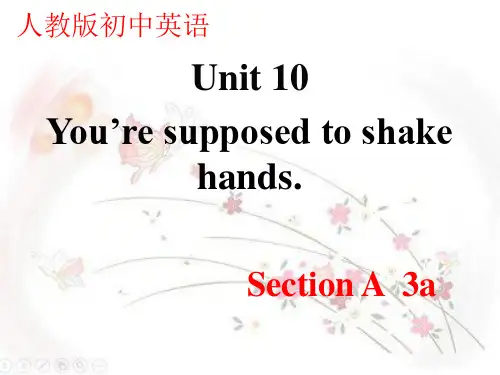
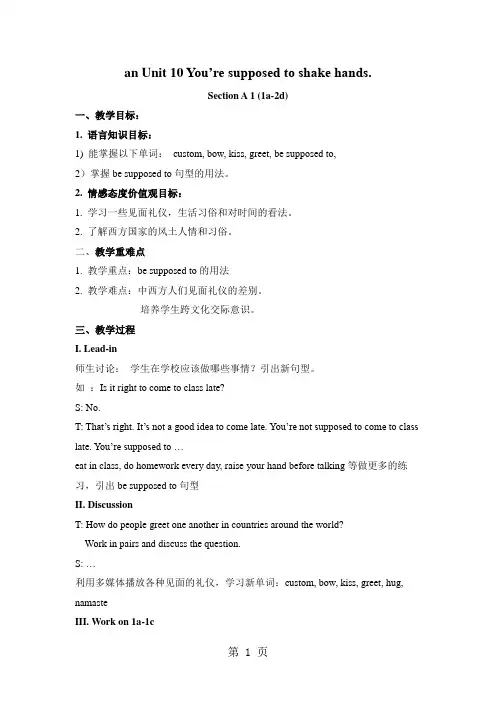
an Unit 10 You’re supposed to shake hands.Section A 1 (1a-2d)一、教学目标:1. 语言知识目标:1) 能掌握以下单词:custom, bow, kiss, greet, be supposed to,2)掌握be supposed to句型的用法。
2. 情感态度价值观目标:1. 学习一些见面礼仪,生活习俗和对时间的看法。
2. 了解西方国家的风土人情和习俗。
二、教学重难点1. 教学重点:be supposed to的用法2. 教学难点:中西方人们见面礼仪的差别。
培养学生跨文化交际意识。
三、教学过程I. Lead-in师生讨论:学生在学校应该做哪些事情?引出新句型。
如:Is it right to come to class late?S: No.T: That’s right. It’s not a good idea to come late. You’re not supposed to come to class late. You’re supposed to …eat in class, do homework every day, raise your hand before talking等做更多的练习,引出be supposed to句型II. DiscussionT: How do people greet one another in countries around the world?Work in pairs and discuss the question.S: …利用多媒体播放各种见面的礼仪,学习新单词:custom, bow, kiss, greet, hug, namasteIII. Work on 1a-1c1. Work on 1a多媒体呈现1a图片,让学生根据图画内容,说说图中的握手,接吻,鞠躬是哪个国家的礼仪,然后按要求把书本给出的“国家”和“习俗”连接起来。
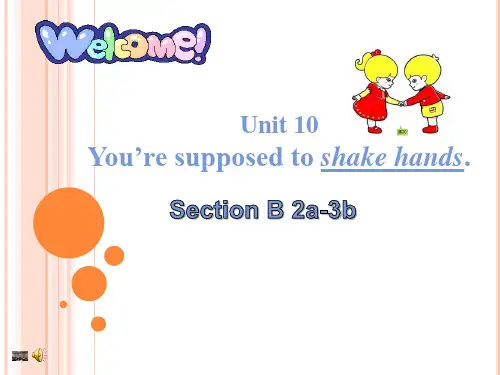
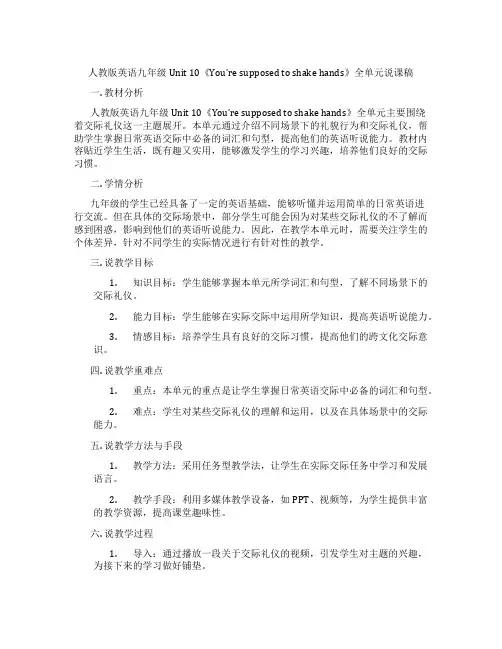
人教版英语九年级Unit 10《You’re supposed to shake hands》全单元说课稿一. 教材分析人教版英语九年级Unit 10《You’re supposed to shake hands》全单元主要围绕着交际礼仪这一主题展开。
本单元通过介绍不同场景下的礼貌行为和交际礼仪,帮助学生掌握日常英语交际中必备的词汇和句型,提高他们的英语听说能力。
教材内容贴近学生生活,既有趣又实用,能够激发学生的学习兴趣,培养他们良好的交际习惯。
二. 学情分析九年级的学生已经具备了一定的英语基础,能够听懂并运用简单的日常英语进行交流。
但在具体的交际场景中,部分学生可能会因为对某些交际礼仪的不了解而感到困惑,影响到他们的英语听说能力。
因此,在教学本单元时,需要关注学生的个体差异,针对不同学生的实际情况进行有针对性的教学。
三. 说教学目标1.知识目标:学生能够掌握本单元所学词汇和句型,了解不同场景下的交际礼仪。
2.能力目标:学生能够在实际交际中运用所学知识,提高英语听说能力。
3.情感目标:培养学生具有良好的交际习惯,提高他们的跨文化交际意识。
四. 说教学重难点1.重点:本单元的重点是让学生掌握日常英语交际中必备的词汇和句型。
2.难点:学生对某些交际礼仪的理解和运用,以及在具体场景中的交际能力。
五. 说教学方法与手段1.教学方法:采用任务型教学法,让学生在实际交际任务中学习和发展语言。
2.教学手段:利用多媒体教学设备,如PPT、视频等,为学生提供丰富的教学资源,提高课堂趣味性。
六. 说教学过程1.导入:通过播放一段关于交际礼仪的视频,引发学生对主题的兴趣,为接下来的学习做好铺垫。
2.新课呈现:教师带领学生学习本单元的词汇和句型,并通过真实场景的展示,让学生了解不同场景下的交际礼仪。
3.课堂互动:学生分组进行角色扮演,运用所学知识进行实际交际,教师巡回指导,纠正发音和表达错误。
4.巩固练习:教师设计一系列练习题,让学生在纸上完成,检测他们对本单元知识的掌握程度。
初中英语九年级Unit 10 You’re supposed to shake hands. Section B 2a-2e 教学设计一. 教材分析本课选自人教版英语九年级Unit 10 You’re supposed to shake hands. Section B 2a-2e。
本节课主要介绍了不同文化背景下的礼仪差异,通过对话形式展示了在不同的场合如何正确地使用礼仪。
教材内容丰富,贴近学生生活,能激发学生的学习兴趣,培养学生的跨文化交际意识。
二. 学情分析九年级的学生已经具备了一定的英语基础,能够听、说、读、写一些简单的英语句子。
但部分学生对英语学习仍存在恐惧心理,不敢开口说英语。
此外,学生对不同文化背景下的礼仪差异了解不多,需要在本课中进行引导和培养。
三. 教学目标1.知识目标:–能听懂、会说、会读本节课的生词和短语。
–能正确运用情态动词和被动语态描述不同文化背景下的礼仪差异。
2.能力目标:–能用英语进行简单的跨文化交际。
–能通过合作学习,提高自己的语言运用能力。
3.情感目标:–培养学生的跨文化交际意识,尊重不同国家的礼仪。
–增强学生的团队协作精神,提高学生学习英语的兴趣。
四. 教学重难点•掌握本节课的生词和短语。
•运用情态动词和被动语态描述不同文化背景下的礼仪差异。
•正确运用情态动词和被动语态进行跨文化交际。
•理解并运用英语表达各种礼仪场合的正确方式。
五. 教学方法1.任务型教学法:通过设定各种任务,让学生在实践中学习英语,提高语言运用能力。
2.情境教学法:创设各种真实的语境,让学生在交流中掌握英语知识。
3.合作学习法:引导学生分组讨论,培养团队协作精神,提高学习效果。
六. 教学准备1.准备本节课所需的课件、教案、录音带等教学资料。
2.准备与本课相关的水果、礼物等实物,用于展示和练习。
3.提前让学生预习本节课的生词和短语,了解基本的文化背景知识。
七. 教学过程1.导入(5分钟)–教师通过展示不同国家的礼仪图片,引导学生谈论各自对礼仪的认识,激发学生的学习兴趣。
Unit10 You’re supposed to shake hands.课文重难点知识点详细讲解1.be supposed to 的用法用法一:be supposed to... 其中to是动词不定式符号,不是介词,其后要跟动词原形。
当be supposed to... 的主语是“人”时,意为“应该……”;“被期望……”,它可以用来表示劝告、建议、义务、责任等,相当于情态动词should。
如:Everyone is supposed to wear a seat-belt in the car.每个人在汽车里都应该系安全带。
Teachers are supposed to treat all the students alike.老师应该对所有的学生一视同仁。
用法二:当be supposed to... 的主语是“物”时,它表示“本应;本该”,用于表示“某事本应该发生而没有发生”。
如:The new laws are supposed to prevent crime.这些新法令本应该起到防止犯罪的作用。
The train was supposed to arrive half an hour ago. 火车本应在半小时之前到达。
用法三: be supposed to后面接“have + 过去分词”时,表示“本应该做某事而没做”。
如:You are supposed to have handed in your homework by now.现在你应该已经把作业交上来了。
He is supposed to have arrived an hour ago. 他应该一小时前就到了。
用法四: be supposed to... 的否定结构为be not supposed to...,它常用于口语中,意为“不被许可;不应当”。
如:She was not supposed to be angry about that. 她本不该为那件事而生气的。